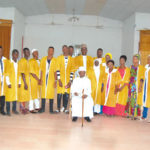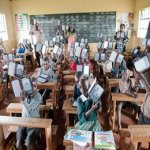COULD you bring us up to speed on the status of your programmes, especially since you recently received a team from the National Universities Commission?
Let me start by taking you down memory lane; how we got to where we are and how we got out of where we were. In 2012, the centre lost some programmes. Our regulatory agency, the Directorate of Distance Learning at the National Universities Commission, visited us in 2012. Prior to that period, there wasn’t much of regulation regarding the conduct of distance education in Nigeria. In fact, it was then at the level of part-time programmes that many universities were running then. The idea of going through the real Open and Distance Education really started about that time. So, about that time, the NUC through its Directorate of Distance Learning had to go round some universities in Nigeria, especially those running part-time programmes on distance education, and we were visited then in Ibadan in 2012. Then in Ibadan, I would say we had 17 departments in which we awarded degrees. There were other subsidiaries, teaching subjects in some departments. That gave us 28 programmes; but when we talk about the platform through we have first degree, then, it was from 17 departments.
When the NUC visited us then, we did very well in administration, structure, and all other areas. In fact, in some cases we had 100 per cent; but when it came to course materials, we had issues; and these had to do with non-compliance of the course materials with ODL format. So, we lost many of these programmes, and we were left with six programmes. The six surviving programmes then were from the Social Sciences – Economics, Psychology and Political Science. From the Faculty of Education, it was only one programme that survived; that was Social Work Department. From the Faculty of Arts, only two programmes survived. Those were English and Philosophy. We lost programmes like, from the Faculty of Arts, CLA, Linguistics and Modern European Languages. From the Faculty of Education we lost Adult Education, Guidance and Counselling, Educational Management; we lost Library and Archival Information Science. We lost Special Education, Human Kinetics Education. We lost the only programme we had in the Faculty of Science, Statistics. We lost the only programme in the Faculty of Agriculture.
Since then, we’ve been making efforts to bring these programmes back on board, through the intervention of the last administration, led by Professor Bayo Okunade, of which I was the deputy director (Academics), to make sure the departments revised the course materials. We did that internally, but we also engaged some outside agency to help us convert the course materials. There and then, we had to approach the NUC in 2016 that we were ready for the NUC to come and see what we had, but for one reason or the other, the NUC could not come in 2016 that we submitted the proposal. We had to also rejig this; that was around March/April 2017 and reapplied to the NUC that we were ready. I think, in April/May 2017. NUC’s 20-man team visited us on May 1; they arrived Ibadan on May 1 and left on May 4.
We put forward nine programmes: six out of the old programmes. Four of the programmes are from Education – Adult Education, Guidance and Counselling, Educational Management and Library and Archival Information Studies. The only programme (we had and lost) in the Faculty of Science; that is Statistics. Then, from the Faculty of Arts, we approached the NUC again concerning Communication and Language Arts. Then, in Social Sciences, we had a new programme: Sociology. We also had another new programme; that is Computer Science; another programme from the Faculty of Arts, History, What the NUC team came to do was to revalidate the programmes we lost and validate the new ones. And just last week, we had the final verdict from the NUC in which the NUC said we have 100 per cent. This gives the University of Ibadan Distance Learning Centre 15 progreammes; and that really makes Ibadan to be number one talking about the number of programmes we have in the University of Ibadan Distance Learning Centre.
Looking back to the time you took office as director of the centre, how close would you say you are now to achieving the goals you set for yourself?
When we had the good news (last week), I came to instant conclusion that the ambition of three years I set, it would make the goal to be achieved in less than two years. We set the goal of achieving 35,000 students in the next three years; and I premised that goal on the vision that we would get the revalidation and validation (of our programmes). I want to specifically say that in the next three sessions that goal is going to be achieved. Another thing is that apart from teaching and learning that we do here, we also want to impact by way of publication. Already, we’re having the second edition of our UNIBADAN ODL Frontiers. Again, we started to have a book in honour of the former director. The book was just delivered this afternoon. We’ve also been able to do ICT development and taken care of staff development. The other aspect, which I would say will come to light very soon, is our Administrative Block. All efforts to have that are in top gear. I would say that before the end of the year,…in fact, the plan is that by the time University of Ibadan is marking its 70th anniversary in November, the foundation laying is going to be one of the activities that the vice chancellor is going to do by the special grace of the Almighty God.
Your target is to have 35,000 learners on the DLC platform. How many are you running with right now?
Right now, we have slightly above 9000; and that was due to the loss of the programmes, as I told you. We used to have about 16,000 learners in the past.
The beauty of the ODL is that the level of physical interaction between facilitators and learners will continue to reduce. What has changed between when you took office as director and now?
It’s a continuous process from what obtained during the last administration. We still use four weeks for face-to-face interactive session – which of course we are allowed to do; but learners are clamouring for more weeks. I think the NUC says we could go as far as six weeks interactive session. Once they come in for a new session, before they are even invited, they meet the e-tutors online for their courses. Students are not supposed to come here; wherever they are, they do their registration and every other thing (even the continuous assessment) online. It’s only the examination we make compulsory for everybody to come physically to come and do the examination.
You told us what was responsible for the loss of your programmes in the first place. What have you put in place to avoid a recurrence?
We’ve been making efforts. What we’ve done is that we’ve approached the departments to make sure that the departments revise the course materials and bring them in line with the open and distance learning format. That’s an ongoing process.
This centre is a unit of the University of Ibadan. What kind of impact are you making with regard to internally generated revenue?
Let me quickly correct one impression. The centre is not about generating revenue for the university. Education is a social service. I think we should note that very well. But that notwithstanding, because it happens to be an alternative programme, talking about dual-programme in the University of Ibadan, learners will have to pay; because basically the centre is set up for the working class. Although because of the problem of access these days, we also have youngsters coming on board for the programme. So, I would say it’s not just through the tuition that learners pay that we get revenue for the university – and of course which is ploughed back paying for logistics: paying the facilitators. Apart from that, the centre also has other IGR venture through which we propagate the image of the university.
For example, the University of Ibadan happens to be the best partner with the Joint Admissions and Matriculation Board in terms of Unified Tertiary Matriculation Examination (UTME) every year. We have 1500 capacity computer system over there. And I recall very well during the last UTME, about 12000 candidates wrote the exam in our centre.
From your experience, how would you assess the response of people to this mode of learning?
The response still has to do with attitude. People still feel that until you get to the four walls of the classroom you cannot acquire knowledge, which is not so! Globally now, it’s about what is called education without walls; university without borders. Even conventional universities these days do make use of technology to disseminate knowledge. With technology, you can get knowledge better and faster than we do in conventional programmes.
What kind of feedback have you received concerning the acceptability of the certificate issued here? I know you talk a lot about the ‘parity of esteem’, but what is the experience in the market place in terms of acceptability?
We’ve not been getting any negative response from the alumni of the programme. They are everywhere. I must tell you that we have people that finished from the programme who are lecturers in universities in Nigeria and who are also in other establishments. We’ve been getting very positive response. Discrimination is not there; the only thing learners complain about (and this has to do with the young ones among them) has to do with the national service (NYSC). And of course, the philosophy has to do with the fact that (the programme is) meant for the working class. As I said earlier, because of the issue of access, we have more of them now on the programme. That notwithstanding, what we do is to let them have NYSC’s exemption certificate.






